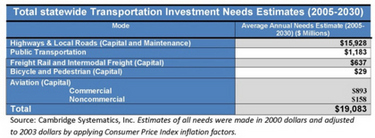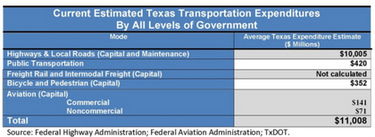
“Dead, Flat, Broke”
February 4, 2010
The Texas Department of Transportation (TxDOT) is dead, flat broke. By 2012, TxDOT will have no money for new roads. Zero. What’s worse is that TXDOT is now robbing Peter to pay Paul. Last month, commissioners diverted maintenance money to new roads to cover accounts for 2010. In other words, TXDOT is now diverting from TXDOT.
Written by Senator Eliot Shapleigh, www.shapleigh.org
The Texas Department of Transportation (TxDOT) is dead, flat broke. By 2012, TxDOT will have no money for new roads. Zero. What’s worse is that TXDOT is now robbing Peter to pay Paul. Last month, commissioners diverted maintenance money to new roads to cover accounts for 2010. In other words, TXDOT is now diverting from TXDOT.
What’s going on here? Why is transportation now one of the top issues in Governor’s debates?
At a recent hearing of the Senate and House committees on Transportation, the Chair of TxDOT's Commission, Deidre Delisi, testified that without a new revenues, TxDOT will not be able to build any new roads after 2012. Then, Amadeo Saenz, TXDOT director clarified that TXDOT will not even have money to properly maintain 191,000 miles of existing roads within two few years. By 2050, when Texas' population will reach 50 million, Texans will find ourselves $250 billion behind in highway construction.
What created this mess?
In short, the purchasing power of the state motor fuels tax—20 cents per gallon—is declining because the gas tax has not been raised in almost two decades and costs of concrete and steel are rising faster than road money. The gas tax is the primary funding source for road construction and it can’t keep up with the growing needs of our economy.
At the hearing, executives who handle logistics for some of Texas’ most successful companies, testified that the Panama Canal expansion and new west coast ports in Mexico will soon send even more traffic up Texas corridors. That’s why representatives of some of the biggest businesses in Texas testified on Monday that “they're on board too” with raising new revenues.
The Local Option Transportation Act, S.B 855, introduced during the last legislative session would have addressed this crisis. Since Rick Perry said flat out he would veto a gas tax, and has failed to provide any statewide solution, the bill instead relied on local leaders to ask voters to approve local fuel, registration and other taxes to finance identified projects. Encountering opposition from Governor Rick Perry, the measure died. A later attempt to pass its main provisions under H.B. 300, the TxDOT Sunset bill, failed as well.
Today, according to TxDOT's testimony, while the operating balance of the State Highway Fund was $68 million at the end of 2009, TxDOT had $285 million in outstanding short-term debt that under current law must be paid off by the end of the biennium. Translation—we are living off of debt service and the credit card has ‘maxed out.”
Diverting road money to other uses like arts, DPS or education has also contributed to the current crisis. For the 2008-2009 biennium, diversions totaled $1.57 billion and equaled 28.2 percent of TxDOT's State Highway Fund Appropriation. While diversions for the 2010-2011 biennium were reduced by $138 million, TxDOT's general revenue appropriation was also reduced from $307 million in 2008-2009 to $165 million in 2010-2011. Both Perry and Dewhurst have pledged to end diversions, but of course, have yet to identify the source of new revenues to replace the money diverted elsewhere.
In a report, titled "Moving Texas to the 21st Century," Cambridge Systematics, a leading U.S. consulting group on infrastructure, reported that Texas highway funds are at least $8 billion short each year from meeting the basic needs of a growing state. Chart 1 shows how much Texas needs to spend to build the transportation and infrastructure we need:
Chart 1
Chart 2 shows how much money we actually have:
Chart 2
With Texas set to add 49 million residents by 2050, we are $256 billion, or $8 billion each year, short of meeting our mobility needs. Remember, basic infrastructure is the key to a competitive economy—without the ability to move people and products, business will go to states and countries that can.
At the hearing, a panel of Texas business and civic leaders appointed by the Transportation Commission testified that the state needs to invest at least $315 billion through 2030 just to maintain roads, deal with congestion, and increase our mobility and safety.
Here’s the reality—TXDOT is dead, flat broke. By 2012, TXDOT will have no more money for new roads. Zero. For Texas to remain globally competitive, Texas people and products need to move faster, safer and smarter. For Texans to meet the challenge of moving us forward, Texans need leaders to solve problems faster and smarter, not secede from reality.

